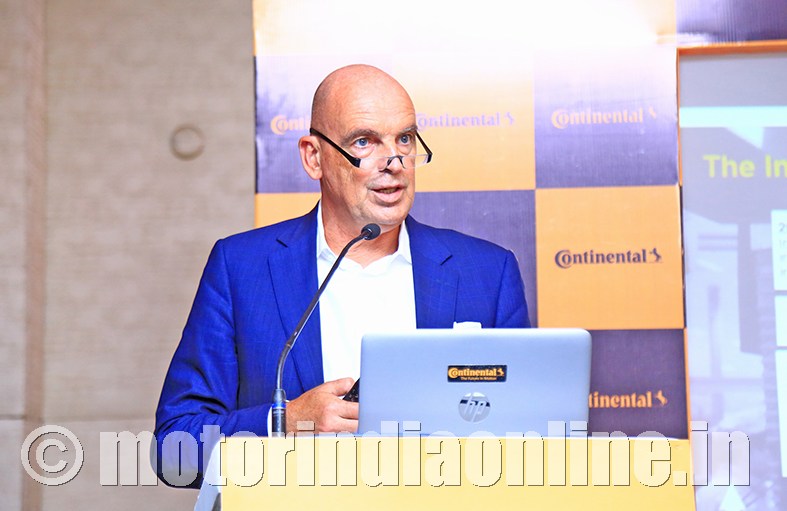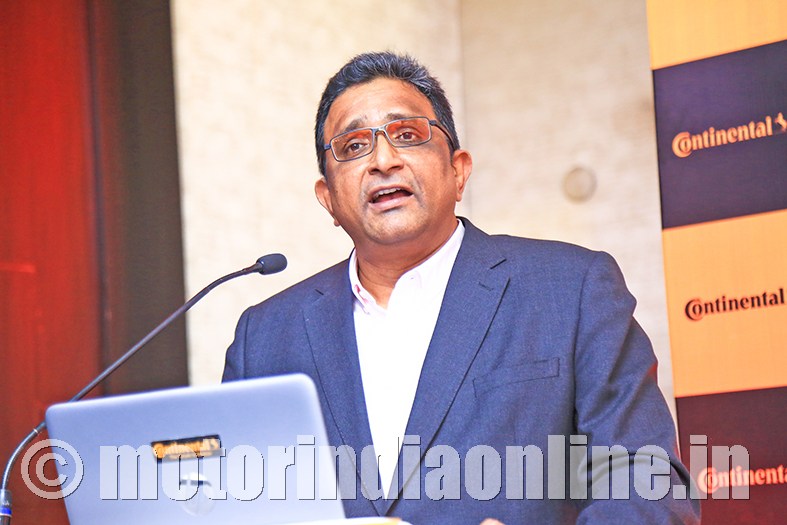Continental – born in Hanover, Germany, 147 years ago – has touched the 10-year milestone in India though its presence here clocks more than 50 years through a JV, and as a technology partner. It was in 2008 that Continental formed its first legal entity in India.
Known as a technology company, Continental stands for ‘safe, efficient, connected, intelligent and affordable mobility solutions’. Continental India celebrates its successful home run in the form of more than 8,000 employees at 15 locations and eight manufacturing facilities with the apex centre based in Bangalore.

Worldwide, Continental Corporation is present in 61 countries and recorded sales of Euro 44 billion in 2017. The five divisions of the corporation are Chassis & Safety, Powertrain, Interior, Tires and ContiTech.
Marking the occasion, Mr. Frank Jourdan, Member – Executive Board, Continental AG, and President – Chassis & Safety Division, Continental Sponsor, Market India, said: “India is an important market for us and we are betting big on it. Financially, we are turning profitable here, the results are good, and we are extremely successful. The future here looks great.”
Mr. Prashanth Doreswamy, MD – Continental India, observed: “In these 10 years, we have grown in many ways – in capabilities, business volumes, manufacturing and R&D footprints, technology and in head counts. And we are significantly contributing to the global requirements. We have started working on the next big opportunities that include AI, high performance computing, passive and active safety technologies and machine learning.”

Continental India is a Tier-1 supplier to the OEMs, boasts of being an R&D and technological hub for their automotive business globally and is a large employer in India. On a celebratory note, the officials announced their capacity extension and greenfield projects, besides a ‘high two-digit million Euro level (or three-digit crore rupees level) that is planned for 2018-2020’.
Continental opened its Technical Center India (TCI) in 2009 that began with 70 people and today it boasts of over 3,000 employees with engineering and advanced degrees and skills. TCI is one of Continental’s three Systems & Technology hubs globally.
Taking pride in it, Mr. Doreswamy shared: “TCI’s capabilities are R&D for three automotive divisions, in product development, in software & IT infrastructure and working on emerging market expertise.”
Prioritizing India
Continental India’s immediate focus is on localizing its value chain, technology, Industry 4.0, sustainability, headcount and increasing the scope and footprint of R&D.
Regarding Industry 4.0, Mr. Jourdan said: “We have for years been working on optimizing our material flow in production, and I think it is what Industry 4.0 is all about. With our systems already in place in India, we will further enhance it by adding say connected robots by standardizing our manufacturing systems to manage processes.”
Mr. Doreswamy added: “India being a cost-sensitive market, we have to optimize by improving our efficiencies, and one way to do it is to automate our manufacturing. A case in point is our recent implementation of COBOT, meaning collaborative robot, which can work alongside humans. A COBOT does the repetitive and monotonous jobs while the personnel who were doing that job earlier can now be put to perform high skill work.”
While it is heartening to see Continental India already working on Industry 4.0, it is hard to ignore the fact that the automotive industry as a whole in India is yet to adopt it fully even if the process is on. Mr. Jourdan responded: “It is true that all the suppliers in the market still need to get to that stage. Yet it will not stop us from serving the industry in the best possible way because Industry 4.0 is all about making the whole process more efficient if done in the way it is supposed to be.”
Mr. Doreswamy highlighted the fact thus: “On the whole, the industry is making progress in this regard, but it has to make business sense as well. In India, it is a balance among the initial investment, the savings and the cost of labour. Industry 4.0 makes solutions more affordable; yet the affordability needs to be either driven by the consumer or has to be pushed by regulations. It is only a matter of time before it becomes a larger reality.”
Addressing transportation needs
In India today, making mass transportation more attractive still poses a complex issue for all the stakeholders involved. In that context, how does Continental think of resolving it by, say, introducing its CUbE or automated driving as a solution in India. Continental’s CUbE, which stands for Continental Urban Mobility Experience, is a test vehicle to enable driverless mobility, especially in the cities. Interestingly, CUbE is undergoing trials on site in Frankfurt, Germany.
Mr. Jourdan replied: “For long haul, mass transportation is the solution, but for the last mile, CUbE is a solution which can take the commuters to different parts of a city. This is a solution for those cities in the world that wish to change their passenger mobility systems. Right now, globally there are many cities which are thinking progressive and are talking to us about it.”
Mr. Doreswamy presented his view: “We need to think what is it that will help in India in the given current scenario. Going step by step, the first is to introduce Electronic Stability Control (ESC) which will function as the basis for any feature related to automated driving. ESC needs sensors to sense the objects around it and give the information to the computing system and then give the message to the brake which will be then applied automatically. And the natural next step is Electronic Brake Assist which is a safety feature. Then another feature is surround sensing to sense say blind spots and warn the driver in advance.”
“These are some steps that need to be taken in India in chronology to establish a firm base for automated driving to come in. Another important thing for automated driving assist is to have standardized traffic infrastructure and management so that the sensors can read the sign boards which are uniform. Our product V2X Communication that communicates with vehicles, signposts and buildings can help measure the distance between vehicles and help compact the traffic, thus aiding in density reduction because it can sense the distance and accordingly increase or decrease the speed on the roads.” he added.
In line with it, Continental TCI is working with IIT Madras to conduct advanced research in machine learning for its ADAS or Advanced Driver Assistance Systems business.
Looking ahead…
As intelligent mobility becomes the basic requirement in India and around the globe, the need for safer and connected driving solutions increases. And Continental India is all set become the game changer for the Indian automotive sector with its new and advanced mobility solutions.